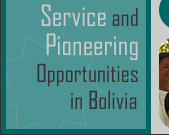 |
||||||||
 |
||||||||
|
||||||||||||||||||||||||||||||||||||||||||
Bolivia is a ideal place for youth who in the future would like to serve as pioneers in developing countries. There are probably few countries that can claim such natural physical and cultural diversity as Bolivia. In Bolivia one can find almost all climate conditions, extraordinary flora and fauna, large areas of virgin territory, and numerous ethnic groups with distinct languages and folklore. Bolivia is a large, land-locked country of about one million square kilometers located in the heart of South America. A large part of the country consists of high mountainous areas with little vegetation. In the lowlands of the north and east, however, vast tropical areas can be found which form part of the outer fringes of the Amazon Basin. Bolivia
has a population of 8 million people, and is a potentially rich nation
in terms of its untapped natural resources and large tracts of undeveloped
land. The under-developed human resources of Bolivia represent one of
the greatest potential forces for the social and economic development
of the country. An estimated 50% of the population still live in rural
areas, a fact that is changing daily as more and more people are driven
to the cities and towns in search of employment and better living conditions. The members of the Bolivian Baha’i Community are continuously increasing their awareness of their responsibilities to the Faith and feel a growing love for Baha’u’llah. The capacities of the believers and institutions are developing in order to carry forward a process of entry by troops through the three core activities: study circles, devotional meetings and children classes. Home-front pioneers will use their capabilities in teaching to help to build communities that are healthier, stronger and in perpetual development. This achievement
is made possible mostly by the institute process that has extended to
many communities and gained the interest of a large a number of the believers.
Currently we are working in a system and holistic fashion with all parts
of the country, doing follow-up and training tutors in order to reach
an unimaginable number of trained human resources and thereby win the
goals that the Universal House of Justice has given us during this formative
age. |
©
2005 Comite Nacional de Servicio y Pionerismo |